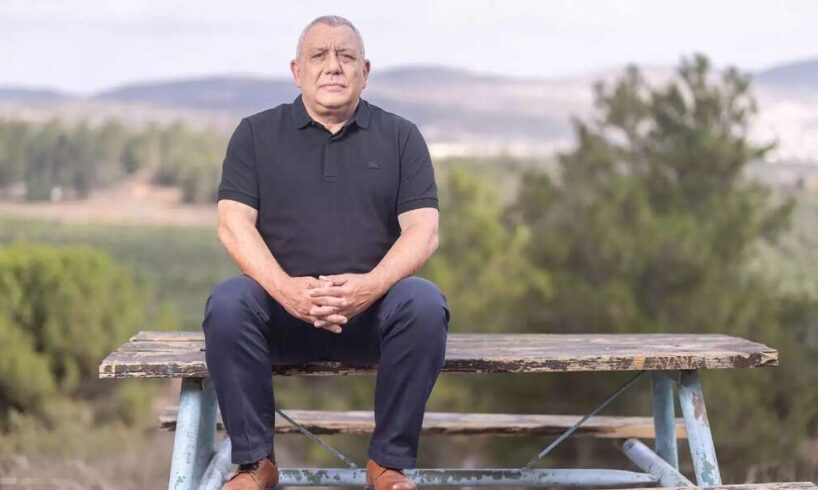
Years in Israeli politics have not turned Gadi Eisenkot into a politician. Even after founding a party, and while weighing whether to announce a run for prime minister, he insists on staying focused and statesmanlike. Some say that is his source of strength. It is certainly his character. The name he chose for his party — Yashar! — was meant to reflect exactly that: both the values and the man.
But today’s Eisenkot is also a troubled citizen. Deeply so. And not just any citizen: he is someone who knows. His decades at the core of the defense establishment and in the cabinet have led him to conclude that Israel faces an unprecedented danger that could become existential. That is why he is now fighting for change, out of fear that in the future there may be nothing left to change.
Eisenkot avoids explosive statements, but even his opponents should pay attention to his words and tone. Not only because he lost his son and two nephews in this war, but because his concern comes from a sober, nonpartisan place. He asks nothing for himself, only for the State of Israel.
With his late son Gal. Photo: IDF Spokesperson’s Unit
“Strategic folly”
“In this war, Israel has normalized insanity,” Eisenkot said. “Three goals were declared: the destruction of Hamas’ military, governmental and organizational capabilities, the return of the hostages, and the removal of the threat from Gaza. Two years later, Netanyahu says none of them have been achieved. That makes no sense. What has happened here is unprecedented in the history of wars: an army that attacks an enemy in October 2023 with five divisions, withdraws, then attacks the same enemy again in March 2025 with five divisions, and now attacks again with five divisions.”
When asked if the army had mishandled the war, he replied:
“No. The army’s command, the cabinet, sabotaged it, not for professional reasons but political ones. Something unprecedented happened here: all the heads of the defense establishment stood before the cabinet and told them that the conditions were met for returning the hostages, that a deal was needed. And the cabinet refused.”
Does Netanyahu not want to end the war?
“Netanyahu neither wants to nor knows how to end it. He and ( Israeli Strategic Affairs Minister Ron) Dermer, an educated man, but someone living in his own fantasy world, cut off from Israeli reality, adopt a quantitative approach. That is why they talk about total victory. They create the illusion that if only Israel strikes hard enough, it will be over. It won’t work. It shows a deep misunderstanding. The struggle is military-strategic, but it is also religious-national. This is a long-term conflict, and Netanyahu is failing here.”
Benjamin Netanyahu. Photo: Marc Israel Sellem Marc Israel Sellem
“In Judea and Samaria, we were given the task during Operation Defensive Shield to defeat terrorism. We did defeat it, and yet we are still fighting there every night. Just this past year, the Shin Bet thwarted a thousand attacks. That is what will happen in Gaza as well. My heart goes out to the soldiers going into combat now.”
Isn’t this still a worthy mission?
“It is a legal mission, but it is strategic folly. We were taught that every Israeli mother should know her son’s fate is entrusted to worthy commanders. I say unequivocally: today’s army is under leadership unworthy of being its supreme command.”
“A betrayal of trust”
Eisenkot argues that the current campaign will not bring Hamas’ immediate defeat. “Without over-philosophizing, ‘defeat’ is a concept at the tactical-operational level. Strategically, the word is ‘victory,’ which means achieving the war’s objectives and improving Israel’s strategic situation. Two years later, Netanyahu says the war goals have not been achieved, and Israel’s strategic position has worsened dramatically, endangering even peace treaties.”
He accused Netanyahu of deliberately obstructing the IDF. “He does not believe in war objectives, or in strategic planning, or in an exit plan for the day after. When an inquiry commission investigates, and I hope it probes not just what happened before October 7 but also after, it will conclude that Netanyahu and the cabinet betrayed the trust of Israel’s citizens. They prevented the army from achieving its goals by keeping it in a war without a compass.”
What does Netanyahu want?
“He is implementing the ‘Netanyahu Doctrine’: to create endless threats for Israel. To wear down the system. As a cabinet member, I heard him a year and a half ago talk about building an autarkic economy. I thought he was joking and asked if he meant North Korea. He nodded yes. He repeated it now with ‘Super-Sparta.’ One must ask how Netanyahu, who once advanced Israel, now embraces such extreme rhetoric. It is a betrayal of trust, and I am avoiding a harsher word.”
Treason?
“Yes. That is why I say the cabinet is betraying the trust of citizens and soldiers. And in doing so, it tramples with a heavy foot on all the heads of the security establishment.”
Would Israel survive under Netanyahu’s Spartan vision?
“No. I think it poses a threat to the state’s future. His desire to isolate Israel and rely only on a Republican administration endangers the country. Israel wants to belong to the region and to the family of nations. Netanyahu is dragging it into an extremist, blind approach doomed to fail.”
Eisenkot said Netanyahu ignored explicit warnings. “The deputy head of the National Security Council wrote him a memo in January 2024 saying the war was bound to fail. We warned that without solving the hostage issue, the war would fail. But he torpedoed deals. We offered solutions, but he chose force and more force, an endless war, and gimmicks like humanitarian aid schemes, family clan arrangements, and aid funds.”
Is what is happening now just another gimmick?
“No, what is happening now is folly that will not deliver results. Instead of pursuing a deal under the Witkoff framework, to release ten live hostages and 18 bodies, then pause for 60 days and negotiate a permanent cease-fire, demand Hamas’ government resign and its leaders be exiled, and begin a long-term demilitarization-for-reconstruction process, Netanyahu bypassed (Israeli Finance Minister Bezalel) Smotrich and (Israeli National Security Minister Itamar) Ben-Gvir from the right with an extremist approach that will lead nowhere.”
Hostage families rally at Hostages Square. Photo: Gideon Markowicz Gideon Markowicz
The hostage issue deeply frustrates Eisenkot. “That was already evident in the first deal in November 2023, which could have been extended to bring home more hostages and elderly captives. Netanyahu refused. It continued with the Paris talks in February-March 2024, where he kept changing the terms and undermined the negotiating team. On May 27, he presented his own outline and demanded a vote, then two days later unleashed his propaganda outlets against the very plan he had brought to the cabinet. When we realized he was sabotaging the deal deliberately, we decided to quit.”
“Advisers with stains on their past”
Eisenkot recalled that he was in the cabinet when Israel struck Iran for the first time in April 2024. He said he had recommended a much broader strike. “The IDF prepared three response levels, and I thought it was a serious mistake to hit only a single S-300 launcher. We should have hit all the targets. Ben-Gvir said then it was a ‘lame attack.’ It was the only time I agreed with that clown.”
Still, what about the argument that a broader deal back then would have prevented later assassinations of Hezbollah’s Hassan Nasrallah and the Sinwar brothers, and perhaps avoided war with Iran?
“Absolute nonsense. Hamas would have violated any deal, because it is Hamas. We could have eliminated whoever we wanted regardless. In Lebanon too, the actions were based on years of preparation, and what was carried out was only part of the plan.”
Can the hostages be returned without talks with Hamas and without Qatar as mediator?
“We have one last chance to initiate a move based on the current military pressure, before sinking into Gaza for years. We must stop now and pursue a full or partial deal. Israel’s conditions have been met. Hamas is battered. It is time for an Israeli initiative.”
How can a chief of staff command an operation he does not believe in?
“It is a huge command challenge, a moral dilemma. No chief of staff has ever faced what (IDF Chief of Staff) Eyal Zamir faces now. His responsibility compels him to lead the campaign, but also to seek every possible way to advance a hostage deal and avoid a years-long quagmire.”
Some urge Zamir to resign.
“Eyal is an excellent chief of staff, deeply committed. He must not resign, unless a red line is crossed in the form of an order blatantly illegal.”
For example?
“To unleash uncontrolled force in violation of law in a dense urban environment. Or, even before that, to order the conquest of Gaza City while knowingly endangering Israeli civilians’ lives.”
So in your view, knowingly endangering hostages would cross that line?
“Yes. In my view, an order that knowingly leads to the killing of Israelis is a red line.”
But Zamir himself has warned that this is the likely outcome.
“That is why he is conducting very precise operations, which put soldiers at greater risk. If there were no hostages in the equation, Israel would have told Gaza’s civilians to evacuate and used firepower differently. And this is why the cabinet is sabotaging the IDF: by refusing to resolve the hostage issue. Hamas could be dealt with on other days.”
Eisenkot spoke harshly about the attempted assassination of Hamas leaders in Qatar. He said they were all marked for death, but striking them at that moment, in a country mediating between Israel and Hamas while a deal was on the table, was, in his view, a grave mistake. “It was a deep strategic failure,” he said. “For the first time it brought together Erdogan and Iran, uniting states hostile to us with the moderate Sunni countries. Netanyahu severely worsened Israel’s international standing, and also handed Qatar an insurance policy. It is part of his extremist approach, which leads him to make misguided decisions that harm national security.”
How could such an operation not be brought before the cabinet?
“Netanyahu sees the cabinet as a nuisance. He works with a small circle of third-tier IDF officers whose common denominator is that each carries some kind of stain in his past. He has no orderly staff work. He scorns state institutions. It’s amateurish and dangerous, and that explains what happened in Qatar.”
Is Netanyahu dangerous?
“Netanyahu endangers Israel’s national security, its international standing, its internal situation. Out of personal and political distress, he is leading Israel to a bad place that threatens all of our future.”
Anarchy in the cabinet
Eisenkot was chief of staff when the cash-filled suitcases from Qatar began flowing to Hamas. “There was a whole debate. The Shin Bet opposed it. In the end, it was decided to proceed, but only on the condition that the money would arrive in suitcases, be distributed at eight points, and given by hand to civilians required to sign for it. I thought that was acceptable, to prevent economic collapse in Gaza. But a month after I left office, the Shin Bet raised the alarm: Mohammed Deif had ordered 40% of the money transferred to Hamas’ military wing. Netanyahu refused to stop it. One must ask why he gave such an unreasonable order.”
Why?
“I don’t know. It requires a thorough investigation of his motives.”
Are you implying he received something personally?
“I don’t know. That must be examined. But what happened is utterly unreasonable. Just like the way his closest people in his office handle classified intelligence and sit in on cabinet meetings. They bring in notes and stay for the most secret discussions.”
Ofer Golan? Nir Hefetz?
“Not Hefetz, the other one.”
Topaz Luk?
“Yes. He would come in, drop a note, and sprawl on a chair while the most secret matters were discussed. In general, Netanyahu’s cabinet meetings are run recklessly. I sat in cabinets for many years. They were always 10–12 people. His are 40–80 people. Assistants and advisers just walk in and sit down. Total anarchy.”
Naftali Bennett calls it ‘treason’. Is he right?
“The story of Netanyahu’s office sounds to me like grave suspicion of treason.”
“Yashar!”
What is Yashar!?
“I wanted something statesmanlike, but since I already played that card in the previous round, I thought the word Yashar (Straight in Hebrew) best expresses the right path for Israel.”
So is Yashar the path, or is it Gadi Eisenkot?
“Yashar is the path of worthy, upright leadership that exists only to serve the citizens. And yes, I am convinced I am an honest and principled man. I’ve proven that throughout my career.”
He said he will form alliances. The party’s creation is meant to establish a platform, a kind of broad aircraft carrier that will eventually be composed of two or three parties presenting a clear line ahead of the next elections. Asked if he is certain there will be elections, he replied: “I’m worried. Nothing is certain. When I entered the Knesset, I thought Israeli democracy was more stable. I discovered it is fragile.”
Why are you worried?
“The legislative branch has been swallowed by the executive branch. The Knesset is struggling to fulfill its role, while Netanyahu and his ministers are busy crushing the judicial system. They are tearing away the basic structure of democracy. That is why we must ensure there will be elections, on time, under supervision, and send Netanyahu the message that if he tries to tamper with them, he will face a powerful front that will not allow it.”
Do you think that could happen?
“The Netanyahu I once knew was a risk manager, attentive, making reasonable decisions. The Netanyahu I see these past two years behaves with a gambler’s syndrome.”
“Do not dissolve the bloc”
What makes you different from other parties in your space? For example, Naftali Bennett. You both talk about being statesmanlike, measured, upright.
“I’ll want to see the objectives of every potential partner. What does he think about Israel as a Jewish and democratic state, about public education, about service for all, about an advanced economy, about law and a constitution for Israel. I’ll demand that all this be agreed before the elections, and that every party I join will be democratic and hold internal elections. I pledge that within a year, my own party will hold primaries in which I will stand for reelection.”
Naftali Bennett None
Do you want to be prime minister?
“I am ready to be prime minister. I can be prime minister. I know the threats facing Israel, I know the challenges, and I know what to do. If I conclude that the way to defeat Netanyahu is to present myself as a candidate, that is what I will do. In any case, I will not let this bloc dissolve. And if I see someone else has a better chance, I’ll know to make the right decision.”
But do you want it?
“I want to oust this government, and bring about a normal government that will lead to healing and repair.”
Do you share the concern of many in your camp about Israel’s future?
“I fear for Israel’s future as I envision it: Jewish, democratic, advanced. A model state among the ten strongest economies in the world, a regional power. My late father immigrated from Morocco; two of his grandsons fell in this war. My wife’s late father was born in Chicago and immigrated to Israel later in life; two of his grandsons also fell in this war. The reason I continue in politics is concern for the future of our children and grandchildren, and to ensure that their sacrifice was not in vain. If we do not make corrections soon, we may endanger our shared future here.”
You mentioned Gal, your son, who was killed in Gaza. When is he most absent?
“Every day, all day. Most strongly on weekends and holidays.”





